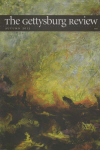The Gettysburg Review – Autumn 2013
The Gettysburg Review deserves its reputation for excellence and consistency. Editor Peter Stitt and his colleagues have put together another issue packed with work that examines the human condition from a number of geographical and emotional perspectives.
The Gettysburg Review deserves its reputation for excellence and consistency. Editor Peter Stitt and his colleagues have put together another issue packed with work that examines the human condition from a number of geographical and emotional perspectives.
This issue gets off to a great start with Joseph Levens’s “Black Sunday.” The somewhat passive narrator of the short story introduces us to Altea, a widow who teaches high school trigonometry. Much more importantly, Altea loves music, Black Sabbath specifically. She puts together a band, though she never plans on performing for anyone. Levens deals with Altea in an honest and unexpected light and the story’s end manages to make use of a unique image to relate the protagonist’s sense of loss. Her husband’s final breath was
held inside a birthday balloon . . . for weeks, shrinking little by little. When it was no bigger than a grapefruit, Altea untied the knot and inhaled the remaining air into her lungs. She left it there as long as she possibly could. Then she exhaled. And then she cried.
Altea earns the greatest compliment a character can pay a reader: we wish we could spend more time with her in the white space that follows the story’s final sentence.
Gabriel Heller shares a very painful experience with the reader: his grandfather, terminally ill, has decided to end his own life. The grandfather was an uncommonly brave man who had survived time in Auschwitz, working his way to a professorship in medicine at the University of Illinois. Heller avoids the clichés common to these kinds of narratives; he doesn’t depict a teary final hour with grandpa and wasn’t there when the deed was done. Instead, the author crafts a powerful remembrance of a man who refused to live in the past and “threw himself into his work, trying with all his energy and will to move forward, to leave the past behind.” In that spirit, Heller ends the piece with a moment that occurred weeks later. In a free moment, he makes his way to Midtown Manhattan in search of the building where his grandparents had lived upon arriving in New York. That building, of course, is gone, but Heller solves the “simple, uncrackable mystery:” our bodies will die and decay, but we reside in the memory of those we affected.
Writers, regardless of skill level or era, are part of a proud fraternity. Paul Zimmer’s poems put him in conversation with Thomas Hardy, his dearly departed brother in literature. Through the course of nine short poems, Zimmer examines Hardy’s “The Fallow Deer at the Lonely House” through a number of lenses. The subject is sometimes the setting of the original poem and sometimes Mr. and Mrs. Hardy themselves. Although we’ll never have an answer, it’s illuminating to consider the specific questions Zimmer asks about the text: “Thomas, why did you write, ‘fourfooted’? I know / ‘Tiptoe’ gave you something to rhyme with ‘aglow.’”
I suppose what I love most about this short suite is something personal. As someone who grew up in the suburbs of Syracuse, New York—the snow capital of the galaxy—I may not have much in common with a Victorian novelist whose works have stood the test of time. After being invited into the conversation by Zimmer (a Wisconsinite), I enjoy that all three of us can deeply appreciate the beauty of a landscape dusted with new-fallen snow and inhabited with graceful creatures.
It’s a bittersweet inevitability that literary journals are increasingly moving online. Like any progress, this development isn’t all bad; there are countless knockout digital lit mags. The Gettysburg Review continues to represent the best of a classic form. This handsome and generously sized volume demands your attention with every element of its production and could very well turn an uninitiated friend or family member into an instant fan of the traditional literary journal.
[www.gettysburgreview.com]





